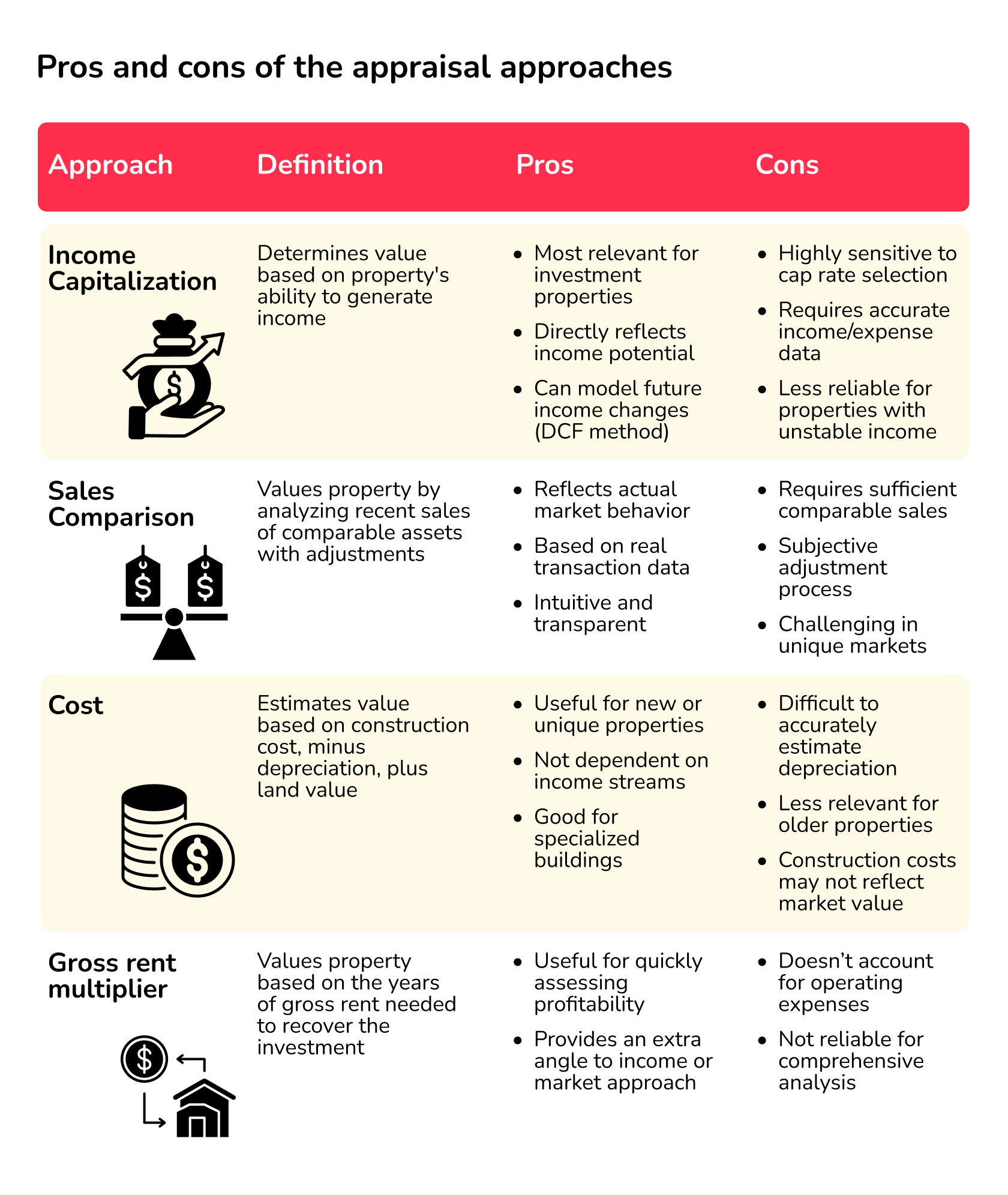Commercial Property Appraisal: Methods, Costs, and Expert Tips for Investors

In today’s CRE landscape, accurate commercial property valuation has never been more critical for identifying opportunities.
These are interesting times to invest in commercial real estate. With Fed rate cuts beginning to ease pressure on capitalization rates, investors are faced with a window of opportunity in which to identify undervalued properties. But how to do that?
Great opportunities – or any investment, for that matter – only come about by making informed decisions. An accurate commercial property appraisal can mean the difference between securing a profitable investment and overpaying for an underperforming asset.
Without professional appraisal expertise, CRE investors face significant challenges in the current market:
- Mispriced assets in distressed sectors create both risks and opportunities
- Rising construction costs impact replacement values and expenses down the line
- Shifting cap rates across asset classes makes accurate investment analysis difficult
Challenges like these make understanding the fundamentals of commercial property appraisal more important than ever. For instance, cost-approach appraisals help price in rising cost constructions, while an income-based valuation can help account for shifting cap rates.
Understanding the appraisal process for commercial properties gives you a big advantage, whether you're evaluating a potential acquisition, refinancing an existing asset, or seeking equity partners.
This guide walks you through three essential commercial property appraisal methods, the costs of getting an appraisal for commercial property, and expert strategies to help you navigate the property appraisal process and identify profitable investments in a shifting market.
[Duckfund's soft deposit financing solutions empower investors to act swiftly on appraised opportunities. Borrow up to $100 million for debt and equity deals across all property sectors.]
4 Methods for Commercial Property Appraisal
How is commercial property appraised? “While commercial appraisals are an integral part of assessing the value of a property, the appraisal process itself can be quite overwhelming — especially for those who haven’t gone through it before,” Carl Streck remarks, who is the CEO of real estate tech solution MountainSeed.

That’s why it helps to first go through the basics. Below are four fundamental appraisal methodologies that CRE professionals rely on to determine the value of a property:

1. Income capitalization approach
The income capitalization approach is a straightforward method to determine a commercial property’s value based on its ability to generate income. Needless to say, this approach is mostly used when investing in steady income-generating properties. Think of small office buildings, retail centers, and multi-family apartment buildings.
The valuation method uses the following formula:
Property Value = Net Operating Income/
Capitalization Rate
This requires you to first calculate the net operating income (NOI) by subtracting operating expenses from effective gross income.
Two variations exist for the income approach to property valuation: The direct capitalization method and the yield capitalization method, also known as the discounted cash flow analysis.
First, the direct capitalization method takes a single year’s NOI and divides that by a cap rate, assuming stable income and expenses.
Let’s put this valuation method into practice: A retail property that generates a yearly $500,000 in rental income with $100,000 in operating costs and a 7.5% cap rate would have an appraised value of $5,333,333.
(In this example, the NOI is $500,000-$100,000=$400,000. You then divide this by the market standard cap rate for similar properties, $400,000/0.075=$5,333,333.)
Second, the yield capitalization method is a more complex appraisal report for volatile investments that factors in projected changes in income and cost over time. Rather than just looking at single-year income, it allows investors to focus on the long-term value of an investment in a rapidly changing market.
Andrew Dorr, member of the Appraisal Institute (MAI) and Vice President at CBRE Valuation notes that “The income approach is typically given primary emphasis in our final reconciliation of value.” Dorr added that, “However, I would say the discounted cash flow is given even more consideration (as compared to the direct capitalization method) in today’s market.”

The yield capitalization method estimates the property’s market value as the present value of future expected cash flows.
We do this by creating a multi-year pro-forma of the property's income, property tax, expenses, and cash flow, including the sales price at the end of the holding period. These cash flows are then discounted back to the present through a discount rate that reflects investment risk and market conditions. It’s a technique also known as a discounted cash flow analysis (DCF).
2. Sales Comparison Approach
The sales comparison approach (SCA) values property by analyzing recent sales of comparable properties. Also known as the market approach, this method follows the principle of substitution: A buyer won't pay more for a property than the cost of acquiring a similar one.
This process consists of:
- Identifying recent comparable sales
- Adjusting for differences in location, size, quality, and market conditions
- Reconciling adjusted values to determine the subject property's worth
This method is most effectively applied in active commercial real estate markets with sufficient transaction data. A thorough commercial appraisal using SCA involves analyzing multiple factors, including location attributes, physical characteristics, and market conditions.
3. Cost Approach
The Cost Approach estimates value based on what it would cost to construct an equivalent building, minus depreciation, plus land value. The formula is:
Property Value = Cost of Construction−Depreciation+Land Worth
This method is particularly handy when valuing:
- New or recently constructed properties
- Special-purpose buildings like schools, churches, or hospitals
- Properties with few comparable sales.
For example, if a commercial building would cost $5 million to construct new, has depreciated by $1 million, and sits on land worth $2 million, its estimated value would be $6 million.
4. Gross rent multiplier approach
The gross rent multiplier approach (GRM) is a simple valuation method like the market approach but uses gross rent rather than sales data. It doesn’t account for property taxes, utilities, insurance, and other expenses.
The GRM of a property tells you the number of years of gross rent receipts it would take for the property owner to recover the investment made in the commercial real estate property. That makes for the following property value formula:
Property Value = Annual Gross Rents x Gross Rent Multiplier
To arrive at the GRM needed to calculate the property value, you need to establish the multiplier for similar properties in the area. In general, a low GRM number reflects a better investment.
Which approach should you prioritize?
Each of the above appraisal methods analyzes different aspects of an investment. Hence, how to appraise commercial property accurately depends on the type of commercial property and wider market trends.
Smart real estate investing takes recognizing which factors will most likely impact an asset's value down the line. Most commercial appraisers use multiple methods to account for these factors, giving greater weight to the most relevant approach. This gives them a more comprehensive perspective on the property before forming an opinion of value.
How much does a commercial real estate appraisal cost?
Let’s move on from the “how are commercial properties appraised” to the “for how much are they appraised”. Understanding the cost of a commercial property appraisal is key to your budget planning.
For starters, the cost of a commercial building appraisal is much higher than for residential real estate – documents easily range between 40-100 pages. And how much does a commercial property appraisal cost?
“The price for a commercial appraisal report can vary significantly depending on the type of property. The average commercial property appraisal costs between $3,000 and $4,000,” according to E. James O'Malley, a certified general appraiser at Bay Area-based Detailed Analysis. He further advises that “when budgeting for an appraisal, setting aside at least $2,000 to $3,000 is a prudent move.”

But setting aside a few thousand dollars might not prove enough. In Southern California, commercial appraisals typically range from $2,000 to $6,000, with complex or special-use properties potentially reaching $10,000 or more, according to the appraisers at West Valuation.
To get an idea of on what end of the price spectrum your appraisal sits, consider the following key cost factors:
- Property size and complexity
- Property type (office, retail, industrial, etc.)
- Report comprehensiveness (restricted, summary, or comprehensive)
- Urgency requirements
- Location and market conditions
When budgeting for a business property appraisal, don’t necessarily go for the cheapest option. Instead, assess the factors that impact the value of the property and try to get a multi-method appraisal report that can provide a balanced analysis.
Why residential appraisers can't value commercial assets
Since residential appraisals are much cheaper than commercial ones, you might think “I’ll just contract a residential appraiser” to save cost. However, commercial property appraisal requires specialized expertise that residential appraisers typically don't possess.
While residential appraisers focus primarily on comparable sales analysis, commercial appraisers use complex income modeling, market analysis, and specialized valuation techniques. Think of factors like tenant risk, complex lease structures, and tax assessments.
That is why commercial appraisers need a General Certified Appraiser license with significantly more training hours and experience with non-residential properties.
AI and the future of appraisal
Artificial is the talk of the town in any data-driven industry. In fact, 95% of real estate firms were already actively interested in AI in 2023. So where are we with AI adoption in 2025 and what does artificial intelligence hold in store for the future of appraisals?

Source: BDO
Already, property valuation tools enhanced with AI can deliver estimates with only a small error margin, significantly improving accuracy – as per a McKinsey report on generative AI in real estate. Take Dutch company GeoPhy's Automated Valuation Model (AVM), which achieves an average predicted value within 5.85% of actual transaction prices – twice as accurate as traditional commercial real estate appraisals, according to research service Nanalyze.
The speed difference is equally impressive. While traditional commercial property appraisals typically take 2-4 weeks to complete, AI-powered systems can generate comprehensive valuations in days or even minutes.
“AI-driven valuation models are really focused on getting appraisals done more efficiently,” Michael Taylor, Partner at advisory BDO Canada, notes. But rather than replace human appraisers, AI is creating a hybrid approach that combines algorithmic precision with human expertise.
Taylor, who leads their real estate appraisals practice, elaborates: "In the past, reports were very manual and relied on human data entry. Now, these machine learning algorithms can help generate a lot of that content for you based on set parameters, which we find is helping to free the appraiser up for more value-added conversations with our clients."

Commercial property appraisal increasingly combines machine learning with human judgment to deliver better results. What does this mean for investors on the lookout for commercial property in 2025?
Forward-thinking investors should consider integrating AI valuation tools into their due diligence process alongside traditional appraisals.
Adopting a hybrid approach gives tech-savvy investors (with knowledge of appraisal methods) the ability to autonomously, quickly and cost-effectively identify undervalued properties before calling in expert appraisers.
[From securing an underwriting-ready appraisal to closing the deal, leverage Duckfund’s equity financing for expertise and liquidity. Get up to $100 million in just five days to help you secure the deal from start to finish.]
Real Estate
Financing

- Approval within 24 hours
- Fund multiple properties at once
- No full deposit upfront — soft deposit only
- Apply in under 2 minutes
Secure your next development — zero upfront capital required.
Start with Duckfund’s Sign Now, Pay Later model.- No capital commitment
- Close faster
- Scale with confidence
